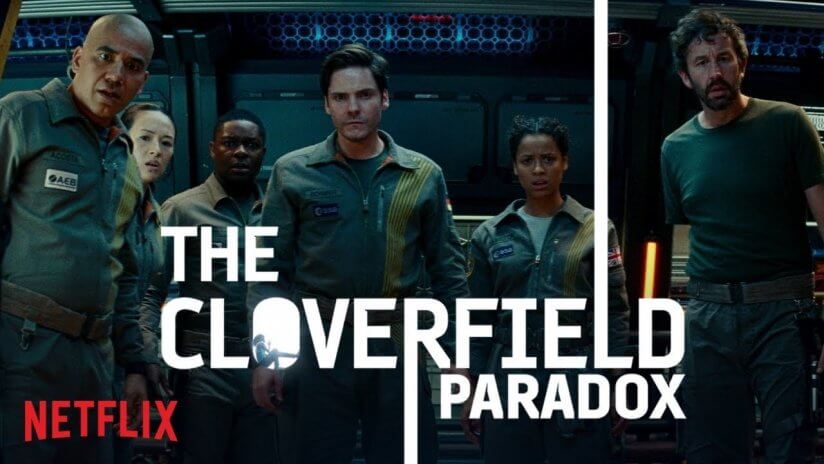In an unprecedented move (after numerous reports of the film being delayed until October 2018), a teaser during the Super Bowl indicated that The Cloverfield Paradox, the third entry to the Cloverfield series, would be available on Netflix immediately following the game. Like most people who don’t care if Milo Ventimiglia gets burned to death by a crockpot, I tuned into The Cloverfield Paradox with much excitement.
I really enjoyed the previous two entries in the franchise, Cloverfield (2008) and 10 Cloverfield Lane (2016). I was excited at the prospect of the unconventional release nature of The Cloverfield Paradox, however it quickly became clear why the third film went straight to Netflix.

The Cloverfield franchise has a habit of using relatively new directors at the time (Matt Reeves and Dan Trachtenberg) and this one is no different as Julius Onah takes the helm. It was written by Oren Uziel (22 Jump Street) and stars Elizabeth Debicki (Guardians of the Galaxy Vol. 2, The Man from U.N.C.L.E.), Daniel Brühl (Captain America: Civil War, The Alienist), Gugu Mbatha-Raw (Beauty and the Beast, A Wrinkle in Time), Chris O’Dowd (Get Shorty, Loving Vincent), David Oyelowo (Selma, Star Wars: Rebels), John Ortiz (Kong: Skull Island), and Ziyi Zhang (Crouching Tiger, Hidden Dragon).
The only “Paradox” of the film is the question: “Why does this exist?” It doesn’t add anything to the franchise other than a muddled connection of how the Cloverfield Monster wakes up (which we already knew from the first movie). It also makes a loose connection to the fallout shelter in 10 Cloverfield Lane with the snooze of a B storyline that only seems to serve this purpose.

Most of the story takes place during a 2 year mission aboard the Cloverfield Station (wonder how they got that name). The crew is testing out the Shepard Particle Accelerator, which if successful would be able to power the entire Earth, but is way too dangerous to test anywhere on the planet itself. By all means, orbiting above it seems better… From here, things go awry once the accelerator is tested. Without going into detail, several of the instances are really cool, but some are just straight up silly. A lot of the moments feel like they’re stolen from more successful Sci-Fi movies (Alien, The Thing).
Besides the muddy story and the generic dialogue, the film is flat out boring and doesn’t tread any new ground. It feels like a more boring version of Danny Boyle’s Sunshine (which itself is a boring version of Event Horizon). All of the space thriller tropes are there: shooting someone out of an airlock, a stranger aboard the ship, going outside to uncouple/fix something, etc.
The cast is decent but there is nothing for them to do. Talents like David Oyelowo and Daniel Brühl are wasted because they barely have anything meaningful to do. Their screen time is sacrificed for Elizabeth Debicki who somehow manages to do less than her last space role, Ayesha (Guardians of the Galaxy Vol. 2). The only person who shines is Gugu Mbatha-Raw, who is the main character and actually experiences a range of emotions throughout.
I think “disappointing” is the word I would use to describe The Cloverfield Paradox. The sudden drop after the Super Bowl as a Netflix Original is clearly a marketing gimmick because I honestly don’t think many would have gone to see it in theaters after seeing the reviews. It’ll be interesting to see if the next film Overlord (Cloverlord?) will be released in theaters or relegated to the same fate as its predecessor.
The Cloverfield Paradox suffers from a cliched sci-fi story that offers nothing new and is weighed down by attempts to tie it to the predecessors. It barely leaves the atmosphere at a pathetic 3 out of 10 stars.

The Cloverfield Paradox is available right now on Netflix.
More from Kyle Dodson:
Album Review: Foo Fighters – Concrete and Gold
Movie Review: The Lego Batman Movie
Kyle Dodson is a writer, comedian, Rock Solid Podcast producer, Batman aficionado, facial hair connoisseur, and oxford comma supporter.

